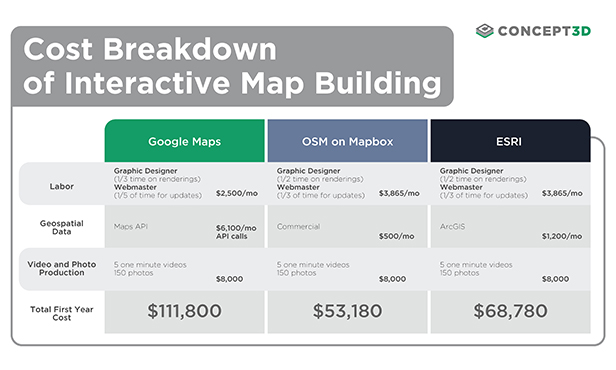For many larger, tech-savvy companies and event venues, when a software need arises, a similar discussion takes place: is this something we can build and maintain ourselves, or better to invest in a third-party system to meet the need?
The market for event management software - spanning everything from venue management to ticketing, analytics, marketing and more - is growing at a phenomenal rate, and a recent report estimates the market to be worth 11.06 billion by 2020.
In this piece, I’ll break down some advantages and disadvantages of each side of the buy vs. build discussion, with a specific focus on my area of expertise: digital mapping software.
Buy
The buy or build question is one many companies ask regarding many aspects of business - from using an outside marketing or events agency, to building interactive tours and maps. Many of these decisions are long-term investments, so it’s critical to spend time up front evaluating the available tools, trying them out and getting input from others.
Save Time (and ultimately, money): One advantage to buying software is the potential to save a lot of time, hassle and money overtime - this is particularly true for companies without a sizable tech workforce. While the up-front and ongoing costs are a significant budget factor, it’s important to think about the lifetime costs of building and maintaining software.
Established, Expert Support: Buying software comes with an accessible team of experts to help guide you through the onboarding process and any support you will need down the line. Inevitably challenges or changes will arise and having this expert, on-hand support helps avoid company bottlenecks.
Technology: Buying software can come along with the benefit of having other technology, like Google Maps, live data feeds and virtual reality integrated into the platform. Having all of this tech available on day one of a new client partnership makes building and upkeep of the software easy to use.
Access: Building your own system means you have to have one person or a team that really knows it and has the time to maintain it. By necessity, third-party software systems are designed to be accessible and (ideally) simple to use.
For the many companies and organizations without an in-house set of experts, buying event tech software can save a lot of time, money and energy - from both a short- and long-term perspective.
Build
Using an in-house team to build a software platform can offer variations in price and flexibility. Event and meeting venues with sizable tech teams should consider the build approach if they can’t find the software that meets their needs.
Flexibility: Using an in-house team to build software can certainly offer greater flexibility to focus on the top priorities for your event and meeting venue. For example, a task such as building a virtual tour system may seem like an approachable project depending on the company’s wants and needs.
Cost: Depending on the size of your project, you may be able to save money by using the talents of an in-house tech team. The chart below provides estimates to be expected when developing an interactive map system in-house. As you’ll see, the geospatial data is the most expensive part of building an interactive map and can cost anywhere from $68K-$112K.

Ownership: If you’re interested in owning the software outright, then building is the approach for you.
Customization: If you require a highly customized solution - and nothing in existing software solutions can meet those needs - then you should consider building your own software.
There’s a lot to consider when a sizable technology need arises. I always welcome these conversations, because a big part of my job is steering people in the right direction. At the end of the day, we’re all looking for the best tools to help us manage our day-to-day needs in the most cost-effective and efficient way.
Don’t miss any event news! Sign up for any (or all) of our e-newsletters HERE & engage with us on Twitter, Facebook, LinkedIn & Instagram!




Add new comment